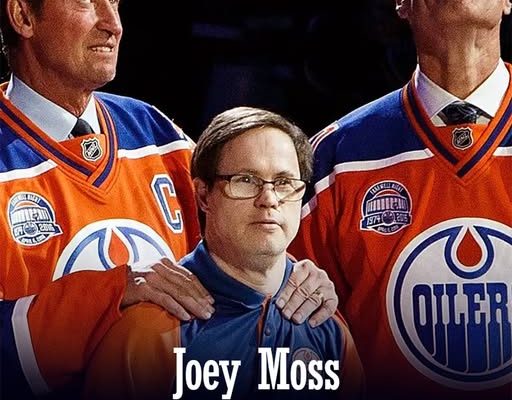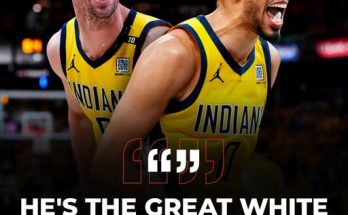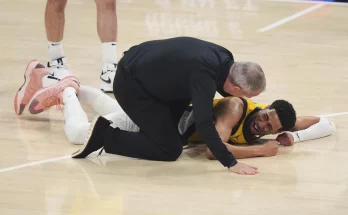In the annals of sports history, there are figures who etch their names into greatness through goals, assists, saves, or championships. Then there are those whose legacy transcends the box score—individuals whose presence shapes the culture of a team, inspires a city, and teaches the world something far more profound about humanity. Joey Moss was one of those rare individuals. Though he never laced up a pair of skates or scored a goal for the Edmonton Oilers, he was every bit a legend, as iconic and integral to the team’s identity as the championship banners hanging from the rafters. His life was a testament to the power of joy, dignity, and inclusion. And while his story begins humbly, its impact stretches wide and deep, woven permanently into the fabric of Edmonton sports history.
Born in 1963 with Down syndrome, Joey Moss entered a world that didn’t always make space for people with disabilities. But Joey’s family, and later his extended family in the world of professional sports, saw him for who he was—capable, loving, and full of boundless energy. His break came in the early 1980s thanks to a chance encounter with greatness. Wayne Gretzky, already becoming the face of hockey, was dating Joey’s sister Vikki at the time. During his visits to the Moss household, Gretzky noticed Joey’s strong work ethic and infectious personality. Recognizing something special, Gretzky recommended Joey for a job with the Edmonton Oilers. The organization welcomed him with open arms, giving him a position as a locker room attendant—a move that would change countless lives, not just Joey’s.
From that first day with the Oilers, Joey Moss became more than just a team staffer. He was part of the soul of the organization. He performed tasks like folding laundry, organizing equipment, and filling water bottles with a joy and dedication that inspired everyone around him. But Joey’s contributions went far beyond the duties listed in a job description. His daily presence reminded players, coaches, and management of the core values that define great teams—respect, commitment, humility, and love. And in return, the Oilers gave Joey something far more valuable than employment: a sense of purpose and a lifelong family.
Joey was there during the golden era of the Oilers, experiencing firsthand the dynasty years of the 1980s. While stars like Gretzky, Mark Messier, Jari Kurri, Paul Coffey, and Grant Fuhr grabbed headlines, Joey provided the glue behind the scenes. His energy never waned. His support never faltered. In the elation of victory and the heartbreak of defeat, he was a stabilizing force. Players would often recall how Joey’s smile after a game—win or lose—helped them regain perspective. He didn’t just keep the locker room organized; he kept the team grounded.
Over the years, Joey became a mentor in his own right. Young players coming into the team learned what it meant to carry themselves with professionalism and humility, often by simply watching how Joey went about his day. He led by example, always arriving early, working hard, and treating everyone with kindness. Veteran Oilers like Kevin Lowe and Ryan Smyth frequently spoke about how Joey influenced their attitudes and behaviors. For Sam Gagner, Moss was more than a colleague; he was a friend who offered lessons in perseverance and unconditional support.
Joey Moss’s connection to the city of Edmonton only deepened over time. He didn’t just work for the Oilers—he also became a fixture with the Edmonton Eskimos (now the Edmonton Elks) football team, serving as a locker room attendant there as well. His presence across both franchises cemented his status as a dual-sport icon. You couldn’t talk about sports in Edmonton without invoking Joey’s name. He became a symbol of what was good and enduring about the city: its loyalty, its heart, and its capacity to embrace people for who they truly are.
Throughout his life, Joey was honored in many different ways. He was inducted into the Alberta Sports Hall of Fame, a recognition not for goals scored, but for lives touched. The Oilers established the Joey Moss Cup, an annual intra-squad scrimmage that marks the end of training camp and celebrates Joey’s contributions. That game, more than just a preseason tune-up, has become a moment of reflection and celebration—a time to remember what Joey stood for.
What made Joey’s story even more powerful was the genuine affection people felt for him. He wasn’t admired out of pity or obligation—he was loved deeply and authentically. You could see it in the way players lit up when he entered the room, in the way he was included in team photos and celebrations, and in the way fans cheered his name. Joey had a gift for making people feel seen and appreciated. His hugs were legendary. His renditions of the national anthem—sung with unfiltered emotion—often brought people to tears. He wasn’t trying to impress anyone; he was simply living with joy, and in doing so, he reminded everyone else to do the same.
When Joey passed away in October 2020 at the age of 57, the outpouring of grief was staggering. Social media overflowed with tributes from former and current players, fans, celebrities, and everyday Edmontonians. Murals went up across the city. Candlelight vigils were held. People shared their memories—watching Joey dance in the locker room, catching a glimpse of him at practice, or simply hearing him laugh. It felt as though the city had lost a member of its family, because that’s exactly what Joey had become.
His death was a poignant moment, not only for the Oilers or the sports world, but for society as a whole. In an era where performance often trumps character, where image often outweighs substance, Joey Moss was a reminder of what truly matters. He showed that inclusion isn’t about charity—it’s about recognizing value. He proved that everyone, regardless of ability, has something meaningful to contribute. And he demonstrated, day in and day out, what it looks like to live with passion and gratitude.
The Oilers honored Joey in many ways after his passing, but perhaps the most lasting tribute is how his spirit continues to influence the team. His image remains in Rogers Place, his name is spoken with reverence, and his story is told to every new player who joins the organization. In moments of challenge, the team often reflects on Joey’s example—his consistency, his resilience, and his unwavering positivity. He may no longer be physically present, but his legacy is everywhere.
Beyond sports, Joey Moss has become a symbol of what communities can achieve when they embrace every member. His story has inspired initiatives around inclusion and employment for people with developmental disabilities. Parents of children with Down syndrome often point to Joey as a beacon of hope—a real-life example that their children can lead full, impactful lives. For advocates and educators, Joey’s life has become a teaching tool, proof that barriers can be broken when love and opportunity come together.
In a world where we often look to celebrities and athletes for inspiration, Joey Moss reminds us that the greatest heroes can be found in the most unexpected places. He didn’t need fame or fortune to make a difference. He just needed the opportunity to be himself—and a community willing to see his worth.
As the years pass, new generations of Oilers fans will hear the name Joey Moss and perhaps see it carved into a wall or etched onto a jersey. They may not have seen him in action, but they will feel his presence—in the camaraderie of the locker room, in the joy of a team celebration, in the respectful way the Oilers treat their staff and each other. Because Joey Moss didn’t just work for the team. He helped define it. He became its conscience, its heartbeat, its soul.
And so, the story of Joey Moss endures—not in stats or trophies, but in the hearts he touched and the lives he changed. His legacy is not just one of love and loyalty. It is a legacy of greatness, measured not by what he did, but by how deeply he made people feel. And by that measure, Joey Moss remains one of the most beloved and legendary figures in the history of the Edmonton Oilers—and in the hearts of all who knew him.



